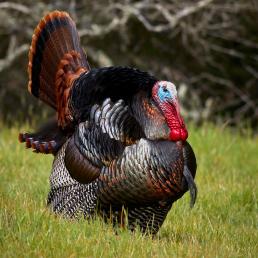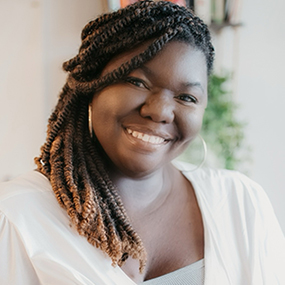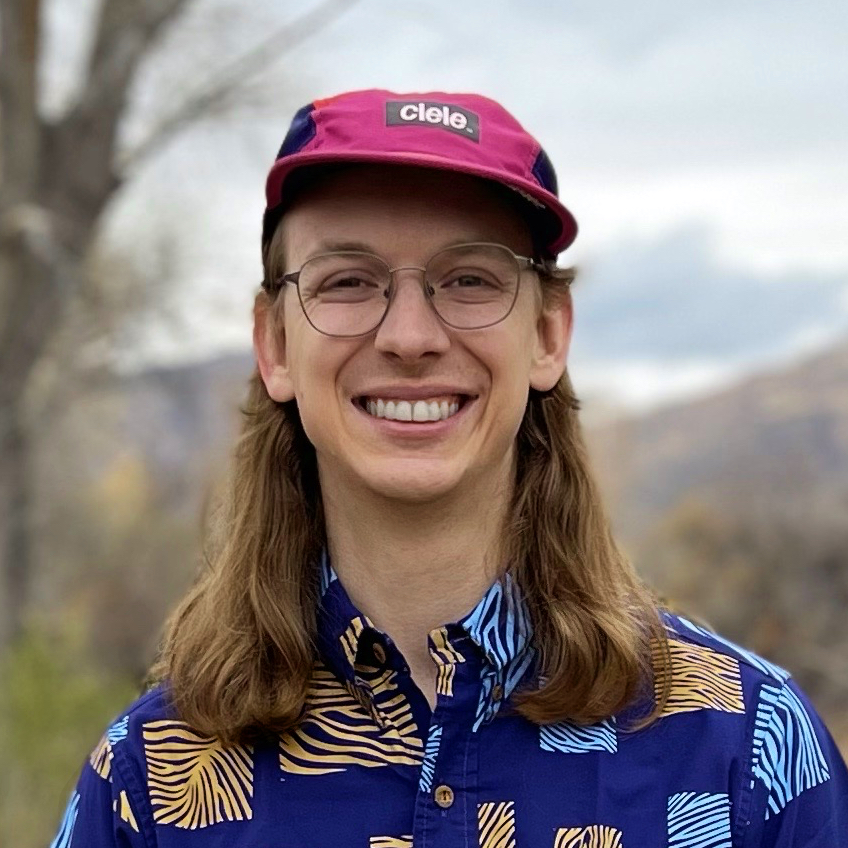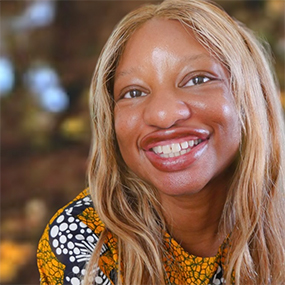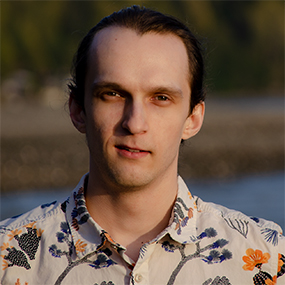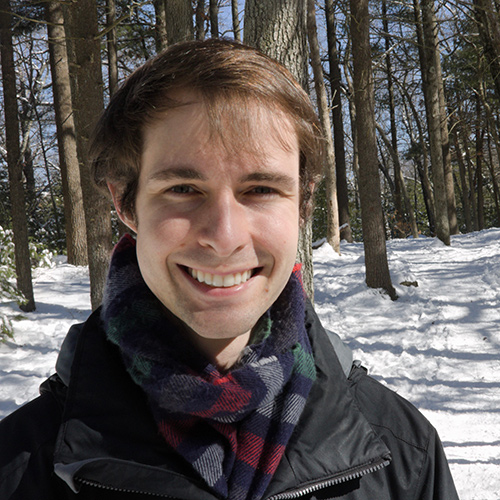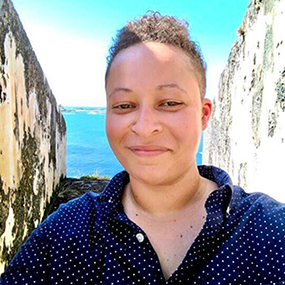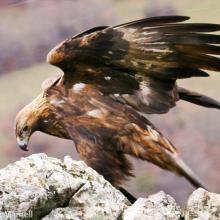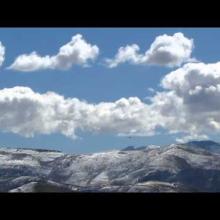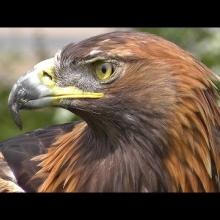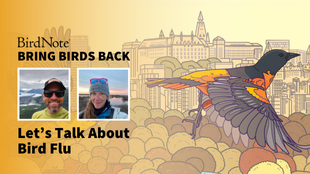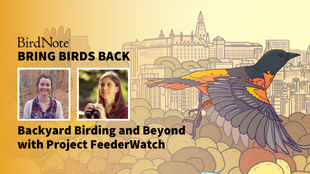

Join BirdNote tomorrow, November 30th!
Illustrator David Sibley and actor H. Jon Benjamin will face off in the bird illustration battle of the century during BirdNote's Year-end Celebration and Auction!

Childhood nostalgia, anyone? Tenijah reminisces about her favorite bird moment in a film and learns all about how it came to be! Our guest this episode is Tony Suffredini, a bird trainer and master falconer, but the real stars are all Hollywood trained professionals – his birds! Tony shares how he got into bird training, how he prioritizes the health and safety of his feathered family on set and how he gives back with his super niche skills as a bird abatement specialist and Golden Eagle conservationist!
Want more Bring Birds Back? Follow us on Instagram! For more BirdNote, subscribe to our weekly newsletter. For ad-free listening and other perks, sign up for BirdNote+ here.
BirdNote is a nonprofit. Your tax-deductible gift makes these shows possible.
Bring Birds Back Season 4 is sponsored by the Cornell Lab of Ornithology.
[Bring Birds Back Stinger]
Tenijah Hamilton: From BirdNote, this is Bring Birds Back. I’m Tenijah Hamilton.
Since I was little, I’ve loved the movie The Next Karate Kid starring Hillary Swank. It didn’t exactly get critical acclaim, but there was something really cool about a high school girl learning martial arts from the Mr. Miyagi. And that wasn’t all she was doing. The emotional core of the film centers around Swank’s character, Julie, rehabilitating a Harris’ Hawk named Angel. At the end, when she releases it back into the wild, I remember having so many questions: That was a real bird, right? Did the bird come back? Does the bird actually have a wounded wing or should we be lobbying for an Oscar Nom for this hawk?
[Clip from The New Karate Kid: “Fly away, Angel!” hawk cries, music swells]
I guess I wondered — how did filming work for Hillary’s feathered co-star? And who was responsible for this on-screen miracle?
Well today, I get to answer those questions and demystify that process with Tony Suffredini — a real-life bird rehabilitator and a big screen bird handler! Tony is known equally in the conservation community and Hollywood. As a generational bird lover, Tony and his twin brother Joe have been influential in both spaces for 25 years now. Tony’s expertise in falconry and bird training is used to make birds stars on film and television. But they do just as much for conservation, bird education and even enviro-friendly abatement — an alternative approach to pest control that Joe pioneered. But more on that later!
In this episode, we lean into Tony’s world as he shares with us how he approaches this thin line between conservation and the silver screen — and what makes it fulfilling for him and his birds, too!
[Disney whimsical/harp-infused music, fairytale]
“Far off in a land of birds, there lived a bird girl with a bird show....”
But first, get comfy…grab some popcorn and raisinets…
[Tick-tick-tick of projector as we “roll the film”]
[Projector spools down]
—Oh, and you might hear sounds from Tony’s chirpy friends in the background. Enjoy the show…
Tony Suffredini: I had the sound crew from the new Planet of the Apes come out and the apes are falconers in the next movie.
[Music begins fading out]
Tenijah Hamilton: Plot twist.
Tony Suffredini: So they needed a bunch of bird sounds.
I'm like, finally it's paying off to have a bunch of noisy birds in my backyard.
Anyway, oh, that's, that's a Rosella you're hearing right now that's beeping like that.
Tenijah Hamilton: Can you tell me more about your birds? Like, I'm curious. What are the personalities here? What are the names? Do we have any divas amongst the midst?
Tony Suffredini: Ah, man, I have such an amazing collection of animals that I take care of and that take care of me. Um, I have some canaries. I have a Blue-crowned Conure and a Black-capped Caique that are pretty noisy all the time. And then, uh, my African Fish-Eagle is probably the noisiest bird I have. And, uh, she spouts off very early in the morning.
Tenijah Hamilton: Has lots of opinions, that one.
Tony Suffredini: Um, my Toucan makes a lot of noise.
I have a, a White-backed Vulture. It's an African bird that I raised from an egg.
And that bird has just a huge personality and can be really affectionate. I have a– a Golden Eagle named Jesus. And, uh, actually I didn't name him. My uncle did. And when he– when I first got him, I took him out of his travel box and my uncle said, ‘Jesus, that's a good looking bird!’ I'm like, that's a good name for him.
Tenijah Hamilton: He had, sort of, this majestic quality about him?
Tony Suffredini: I don't know what just — it really fits him. He's such a — he's the lord of birds, I suppose. I have a– a Raven that, um, is just incredibly intelligent, named Edgar.
Tenijah Hamilton: After...
Tony Suffredini: Uh, I guess Edgar Allen Poe.
Tenijah Hamilton: Yes.
Tony Suffredini: Evermore. But, um, they're just so incredibly intelligent. And, uh, he’s got a great personality as well.
Tenijah Hamilton: How did you get where you are? Like, how did– how did you begin doing the work that you do?
Tony Suffredini: Um, well, I guess it started when I was just a little kid and my father's a really avid bird watcher. So he drug, uh, me and um, my two brothers all over the world looking at different birds that he wanted to see and get on his life list. And my twin brother and I have always really been into animals, all kinds of animals. But the birds were really interesting to us, just the way they live in three dimensions and can fly just fascinated us.
So, [I] went to school, majored in, uh, Exotic Animal Training and Management at Moorpark College back in the early nineties. Graduated in '94 and, um, went to work for a wildlife education company down in San Diego and trained animals and did wildlife education with them, taught kids about the environment and all that good stuff.
Did that for a bunch of years and worked for a company called Birds and Animals Unlimited. They do the animal show at Universal Studios, but they also do a lot of studio work.
So basically putting animals in front of a camera and, uh, training them to do the action prescribed in the script. So, after working at the show and learning all those different animals and kind of finding my niche with birds, that's what I do now.
Tenijah Hamilton: That is incredibly cool. But I wanna take us back a little bit to baby Tony. Because you already mentioned that your dad took you and your brothers around the world kind of looking at birds.
And I'm wondering if you remember what your first profound experience with birds were?
Tony Suffredini: Oh, man, yeah, I can remember like it was yesterday and I think I was just a little, little kid when it happened. But we were up north, maybe Canada - I don't even remember - bird watching. There's this giant gorge and we were kind of on the rim of the gorge and my dad pointed out a Peregrine Falcon up in the sky circling above the gorge.
And, uh, soon as he pointed it out, another bird, a prey bird, like a flicker - I don't even remember the species, it was so long ago. And I watched that falcon do its stoop, came straight down out of the sky. Fastest animal in the world. And you could tell it was going fast and it hit that other bird and it exploded in a big poof of feathers and, uh, the peregrine hit that bird so hard, it was dead on impact and falling from the sky. And the peregrine flipped around mid-air and grabbed the bird before it hit the ground and flew off with it.
Tenijah Hamilton: Wow.
Tony Suffredini: I was like, oh my god. That was incredible.
Tenijah Hamilton: See, that's so funny because, me, I see that and I'm like terrified. I'm trying to become more of a nature girl and we're working through that, but I love how you see that and it immediately sparks this kind of lifelong interest.
Tony Suffredini: Just seeing what those birds can do in the wild and how they make a living is just, um —yeah, it's one of the miracles of nature really.
Tenijah Hamilton: So you've mentioned your father a bit and that he is an avid birder. So can you talk to me a little bit about how your father influenced your decision, if at all, to work with birds?
Tony Suffredini: They were very supportive and it started off by catching, you know, crawdads down in the creek and then we found a pigeon. I think that was the only bird my parents weren't happy that we got. His name was Lucky 'cause we found him under a bridge. It was just a baby and we raised it up and, uh, pigeons get very, very territorial when they're imprinted by people. And anybody that came to the door, Lucky would swoop down and try to land on their head and just drive them out of there.
My parents finally got sick of it and they caught the pigeon and took it, uh, 20 miles maybe, and let it go. And, uh, Lucky was home before they were. So, Lucky was with us for a long time.
Tenijah Hamilton: That was gonna be my next question. Like, did that work? And I guess not.
Tony Suffredini: No, it absolutely did not work. And Lucky wasn't a homing pigeon. He was what we call a commie or a common pigeon. But it is, uh, obviously innate in them to be able to home just like, a homing pigeon. Yeah.
Tenijah Hamilton: That, um — as somebody who grew up in New York City around lots of pigeons, I would've never guessed that, um, just common pigeons had that in them to kind of imprint and find their people.
Tony Suffredini: I think that's what I find so interesting about birds is that imprinting that they do — and you can really sort of become part of their family. It's cool that they have so many interesting aspects that allow them to do what they do.
Tenijah Hamilton: So I mean, with that being said, let's talk about falconry because I've already heard you say that's, like, that's your hobby, that's your thing. And I know that it's typically described as the art and sport of training and working with wild birds of prey. But there seems to be so much more to it.
So can you just share with me a little bit about falconry and where the practice originated?
Tony Suffredini: Oh boy.
Tenijah Hamilton: Puts on your professor monocle.
Tony Suffredini: It's been around so long, they say 4,000 years, people have been training birds, and it's basically how people got food before guns and grocery stores were invented. It's a hunting sport and, back in the day, it was how people got clothing.
For example, the Mongolians have a long history, thousands of years of training Golden Eagles to hunt fox. And they use those fox pelts and they need those fox pelts to stay warm in Mongolia, because - I've been there - it's cold.
Tenijah Hamilton: Was there a specific moment that made you want to become a falconer?
[Reflective alternative music starts]
Tony Suffredini: I think the first moment I picked up a bird on the fist and just that feeling of their strength and their beauty just — I'm like, holy crow, I could, uh, I could do this.
And it's a long process to become a falconer. There's an apprenticeship. And you have to take a test, and you have to build a facility for your bird, and it has to get inspected by Fish and Wildlife, usually. And, um, so they don't make it easy but, um, it's possible for anybody.
Probably the hardest aspect is the apprenticeship. You have to find a master general falconer willing to take you on for two years and sort of train you how to work with these birds and keep 'em safe and healthy. And, uh, they're fragile animals in some ways, you know, those feathers are very, very fragile. And if you don't set up their enclosure properly or keep them properly, then they break just one feather and that puts 'em at a disadvantage in the wild. So, they need every feather they have to perform and catch their prey.
Tenijah Hamilton: One of the many reasons, uh, we're really interested in having you on the show is because you appear to kind of marry your work as a Hollywood handler with the very important work of conservation. And I read that you are a raptor advisor for the nonprofit Wings of Discovery, which is dedicated to the conservation of, and education about birds of prey.
So can you talk a little bit about the organization and your role in it?
Tony Suffredini: Um, yeah, I'm a director, and I sort of specialize in one very individual small niche, and that's Golden Eagles. And so it's my passion to train them and release them back into the wild, if possible. And so, I get a Golden Eagle from a wildlife rehab. They were brought in for very different reasons. Every one of 'em has had their own story and I train them how to hunt and get in great shape. And then I release them.
Tenijah Hamilton: Why, um, is education about these birds really important to you and why do you love Golden Eagles so much?
Tony Suffredini: Oh man, they're just an apex predator. I mean, they really are the top of the food chain. And I don't know, there's something about an apex predator that, uh, is really sexy to me.
Tenijah Hamilton: I was about to say it makes you feel alive.
Tony Suffredini: Yeah, geez, they're just such, such cool animals. Golden Eagles, and, you know, orcas and great whites. Just all those top predators just have something special about 'em that makes 'em, that makes 'em special to me in, in some ways.
[Music ends]
These birds deserve human beings not to interrupt their life cycle. And one thing that, that I'm passionate about is how bad rodenticides are for our wildlife. And not just birds of prey, but birds of prey seem to suffer the most from rodenticides.
And for you guys out there that don't know what a rodenticide is, it's rat poisoning. And they always have a secondary, even a third cycle of killing. So the rat dies, something eats that rat, whatever eats that rat dies. And then sometimes whatever eats what ate the rat, and eats that, dies. I don't know if I did that too many times, but basically, rodenticide sucks.
And if I could educate people on that, that'd make me feel good. I think we'd save a lot of creatures if people stopped using, uh, rat poisoning.
Tenijah Hamilton: Mm-hmm. So I definitely don't wanna leave your brother and business partner Joe Suffredini, out of this conversation. How could I, right? You, you, you literally look alike. You're twins, so can't have one without the other.
Tony Suffredini: I'm older. I'm 20 minutes older. I’ll never let him forget that.
Tenijah Hamilton: Yeah, I was about to say, I'm sure he never lives that down.
Tony Suffredini: Sometimes I tell 'em back when I was your age, and then I tell 'em what I was doing 20 minutes ago. It's my only twin joke.
Tenijah Hamilton: That's a good one. That's a good one. Well, the both of you are pioneers in using raptors as a natural, environment-friendly form of abatements at landfills. I've heard you call your brother “The Dumpster King”?
Tony Suffredini: “King of the Dumps.”
Tenijah Hamilton: King of the Dumps! Poetic, honestly, beautiful. Um, and I read that landfills are required by law to scare birds away, which is why they hire falconers like you two. So can you tell us a little bit more about your business, Sky Patrol Abatement?
Tony Suffredini: “Cacaw!”
Tenijah Hamilton: "Cacaw!" That's the, that's the motto. No tagline, just, “cacaw!”
Tony Suffredini: Have to say that after every time. You have to say it every time. Uh, yeah, I mean, uh, my brother, my brother really, really came up with this concept of keeping seagulls out of landfills using falcons. And um, well the reason landfills are required to keep seagulls out of — actually, there's no such thing as a seagull, by the way. Take one step back. There's silver — there's
Tenijah Hamilton: You're about to change the way I think about something that I've known for my entire life? Go ahead.
Tony Suffredini: Yeah my, this is my dad's thing. He would say, oh, look at the seagull. And he would be like, there's no such thing as a seagull. And everybody would be like, why? And he'd be like, well, there's Silver Gulls and there's Laughing Gulls, and there's Herring Gulls, but there's not one seagull.
There's a bunch of different species of seagulls, basically, not one of 'em is called a seagull. Segue into why landfills don't want gulls at their fill is because the gulls will eat the trash and then they'll — they always roost on water at night. And so whether it be a stream down the street or the ocean or any body of water, they're basically taking that garbage out of the landfill and polluting the waterways with it.
And so that's why seagulls are not allowed at the landfill.
Tenijah Hamilton: Yeah, I was gonna say, so where do y'all come in?
[Jaunty, Mischievous Music Starts]
Tony Suffredini: Well, um, a falcon is — they only eat other birds. It's like seeing a great white in the– in the ocean. When the seagull sees the falcon flying around, they leave town 'cause they're in big trouble and they know it. And so it's a really ecological and environmental way of keeping seagulls out of the garbage.
They don't catch many seagulls, almost never, unless the seagull isn't paying attention at all. But they fly away and that's what we want them to do. Go back to the — a more natural food source.
Tenijah Hamilton: Yeah. So, uh, instead of bringing the trash back to the ocean or wherever they roost, they can go and talk about this near death experience they just had with a falcon.
Tony Suffredini: Tell your friends, tell your friends. It is interesting. I mean, they're fairly intelligent birds themselves, and so they, after a few exposures to the falcon, they'll recognize the falconer's truck and take off before you even get a falcon out of the truck.
Tenijah Hamilton: Woah. That is very cool and also very effective.
Tony Suffredini: Yeah, we call it trauma learning. They start connecting the dots pretty quickly that that white truck means, uh, flying death.
Tenijah Hamilton: For, um, anybody who a gull has ever stolen a French fry from on the beach, this is like, oh yeah, there, there's, there's some ideas cooking. I already know.
Tony Suffredini: Payback. I gotta become a falconer. I have to hire a falconer.
Tenijah Hamilton: Playing the long game!
Toni Suffredini: Right. I want my fry back!
[Jaunty, Mischievous Music Ends]
Tenijah Hamilton: Exactly. What are the advantages of using birds of prey as a form of deterrence versus the other options? What are the other options?
Tony Suffredini: Yeah, the other options are not great. Usually it– it involves, like, noise makers, compressed air cannons or even pyro, like bird whistlers —these, basically, firecrackers, you shoot at 'em. What else? They've tried fake, you know, fake owls or fake coyotes to sort of deter the gulls from landing in the garbage and eating.
Tenijah Hamilton: Kinda like scarecrows.
Tony Suffredini: Scarecrows. Yeah. And then they stretch wire and tie mylar over the face. All that stuff involves setup and it's not very effective. But, uh, a falconer can move around and expose these seagulls or gulls, I'm sorry —
Tenijah Hamilton: Telling your dad.
Tony Suffredini: — to this predator and basically set up a presence. And pretty soon, like you said, they'll tell their friends and the landfill will be free of gulls, at least for a little while. But you get, like, migration. So that's interesting too, just watching how these gulls move around the planet. And there aren't very many gulls that just live in one area. They– they migrate and move. So yeah, seeing sort of different waves of different species come through and keeping 'em out of the garbage is kind of rewarding I guess.
Tenijah Hamilton: Hmm. How long does it take for the seagulls to kind of, like, pick it up? Like ‘this is not, you're not welcome’?
I meant the gulls. No seagulls. I meant the gulls. How long does it take gulls?
Tony Suffredini: Yeah. Watch it, lady! Um, well it depends on the time of year. Sometimes when it's– when it's really cold out, for example, those gulls are driven to eat, and they know that the landfills are this source of food, and so you gotta work a lot harder when it's cold out during the winter and raining. When it's harder for them to find their own natural food, then they go to unnatural sources.
[Soft jazz music plays]
Tenijah Hamilton: Next up: Master Falconer Tony fills us in on a research project his feathered family assisted with. And finally, we learn all about how to be a successful bird — and bird trainer — in Hollywood. But first, a short break!
[Music fades]
[Midroll]
[Laid-back lofi music plays]
Tenijah Hamilton: So a little bit of a left turn, but we also found your name attached to this very interesting scientific study that was published in 2017, attempting to understand the mystery that is soaring birds. And it mentioned that, and this is a direct quote, "Soaring birds can balance the energetic cost of movement by switching between flapping, soaring, and gliding flight.” And that, “accelerometers can allow quantification of flight behavior and thus a context to interpret these energetic costs."
Those were a lot of words, but basically you helped scientists study the best methods of recording and analyzing bird acceleration. The paper mentioned that it was a unique opportunity due to your ability to handle the birds, but can you tell us about that experience, and have you participated in other studies before or after?
Tony Suffredini: Yeah. That was a– that was a really cool experience. And it wasn't just the figuring out of how they fly in an air column, it was also to help mitigate the wind turbine industry that puts these wind turbines up in these areas that are a high migration route, usually. If it's a nice windy canyon, then usually there are birds that are flying through it on their migration paths.
So the USGS contacted me and asked me if I was interested in flying my golden eagle in some different areas and putting an accelerometer on the bird's back to get an idea of how a bird flies, basically. And, um, yeah, so we went up to these, um, really remote areas where they had proposed wind turbine sites and I flew my eagle there and he flew really, really well and they got a lot of really cool data.
And I met some really cool scientists that were doing great work. And I think I'm the only non-doctorate listed on that scientific paper. So that was– I was like, ‘Hey, can you put in like, “Master Eagle Falconer,” that would, that would help me feel a little bit better about my role in this science?’
Tenijah Hamilton: And if you could also end it with “cacaw,” that would be great too. Just, I wanna know, I wanna be known as the “cacaw” person, professionally.
Tony Suffredini: Somehow get that in there, please.
No, it was a cool, uh, cool experience and, um, I really appreciate being able to do science like that and help — it's helping birds out and it's, you know, yeah, it's science.
Tenijah Hamilton: It's really cool. We actually, um, have just talked to folks who work kind of in the wind turbine field, and they told me such interesting things about how these soaring birds, they really kind of play in those areas. They play, they kind of glide, they do all these things and have these behaviors.
So, it's really cool to hear the other side of that, which is you providing the bird and talking about, like, how well the bird flew and how that information is going to be used to kind of fuel conservation efforts.
Tony Suffredini: Yeah, yeah, please. Every Golden Eagle is a good save, man. They're just such special animals.
Tenijah Hamilton: Falconry allows important work like bird conservation and enviro-friendly pest control to be done by trained and vetted individuals like Tony and his brother, Joe. Combating environmental threats like gulls polluting waterways with garbage from landfills, and Golden Eagle conservation are no easy feats. Tony’s specialized skills in training Golden Eagles how to hunt and live in the wild are super beneficial to these rare birds.
As Tony mentioned, falconry permits are issued by your state’s local Fish and Wildlife Department following two years of study and requirements. In the face of steep bird population decline, falconry certainly has its own particular role in conservation.
[Relaxing Alternative Music Plays]
Tony’s love for birds is why he’s chosen to cultivate a career working with them. It’s clear that he intentionally gives back through falconry, conservation and abatement— but he seems to find the most joy in befriending and training his birds for film and television. Tony’s birds have appeared in movies such as The Dark Knight, The Proposal, and Evan Almighty. Something he refers to as ‘new experiences and environments’ for his bird buddies.
So, how does one even begin to train a bird?
Tony Suffredini: You have to do your due diligence and desensitize them to cameras, to lights, to um, you know, everything that goes on on a movie set that can be different than what they see on every day.
And so my job is to have them not know the difference between everyday and a movie set. So I literally take my animals everywhere with me and get 'em used to everything that I can. And that makes for a better bird and stress-free. But if you have a bird that's never seen a camera, to them it looks like a big one eyed monster coming right at 'em. So I think that's the difference between like, you know, someone's pet bird and, uh, an animal that's very specially trained to, to work in front of the camera.
Tenijah Hamilton: When you say you take your animals everywhere, where is everywhere? I wanna, I wanna imagine this.
Tony Suffredini: Uh, well, you can't exactly fly a falcon in your front yard or backyard. You gotta take 'em out to different fields and stuff. So the very first thing that's important to an animal that works in front of a camera, whether it be a dog or an eagle- it has to be used to traveling.
And then when we get to someplace, we take them out and reward them for their behaviors. And then we just start adding — we call it distractions. So whether that be a stranger, that's like a big one for some birds. I have a bird that's like still really wary of strangers even though —
Tenijah Hamilton: The stranger danger is strong with that one?
Tony Suffredini: Yeah, yeah, but um, that's just something to know in their behavior. Oh well, she doesn't like strangers or she doesn't like people moving, so when I have her on set, I'm like, nobody move. Everybody holds very still. And then just take my time introducing her to the people that are gonna be involved with her in the shot. Just knowing their behavior and knowing what could scare them. That's the worst case scenario is something scares them and then they don't wanna work on set anymore. So, yeah, we're just super careful with our animals to make sure that, uh, nothing scares them and you can never, uh, make it a hundred percent positive. But some of that negative stuff can turn into positive stuff. So, if it was always happy glory, then they wouldn’t be learning anything.
If I came into the set and, you know, someone fired up a fan and they weren't expecting it, but then I was able to pay them for being calm when the fan turned on then that turns into something that they're learning. And they learn as much from not being successful as they do from being successful.
[Music fades]
Tenijah Hamilton: So, I know that most of the worry around having birds on film and television sets is the number of hours needed to complete a day’s work, right? So, would love it if you could share with us what a work day looks like for them?
Tony Suffredini: We try to limit the schedule to how long they're on set. I just tell production straight up, hey, if you want the best performance out of this animal, it's best to bring us in as close to when you're gonna shoot it as possible.
It's rare that an animal works on set all day long. If they were gonna have falcon action - for example - all day long, then I would have a team of falcons.
Tenijah Hamilton: A team of, like —
Tony Suffredini: Always have a team of them.
Tenijah Hamilton: Bird understudies.
Tony Suffredini: Uh, yeah, yeah.
Tenijah Hamilton: Um, so when you're on set, what kinds of rules and guidelines do you have to follow?
Tony Suffredini: If you look at most, uh, films at the end, you'll see a disclaimer with a stamp: "no animals were harmed in the making of this film."
The movie sets that I work on have an animal safety, uh, representative. There's an organization called American Humane and they always have a representative on set who's read the script, knows the action, and is there to make sure that the animal is safe and happy, and that there's no action that is dangerous for the animal. Or if it is dangerous for the animal, that all the training and safety precautions are in place.
[Contemplative music starts]
Tenijah Hamilton: American Humane, which Tony appreciates for their support on set, was founded back in 1877 to monitor and encourage the proper treatment of animals. The Hollywood division for film and television wasn’t established until 1940, following a pretty horrific death of a horse on set. By 1941, American Humane began observing animal relations on the majority of Hollywood’s film productions. They eventually established their Guidelines for the Safe Use of Animals in Filmed Media, which requires supervisors from the Association to be on-set whenever animals are present to monitor and qualify the production for their now-famous end-credit, “No animals were harmed.” The line only appears on eligible films and tv shows, with its first appearance in The Doberman Gang in 1972.
To be clear, the guidelines are actually the responsibility of the producers on each project, not the trainers or handlers, as many believe. And they’re written in layman’s terms, so literally anyone can follow them. Like, for birds, it states that if they’re “underweight, overweight,” or physically deemed unfit by the supervisor, they will not be allowed on set, which sounds a little weight shamey, but really it’s not about the bird’s appearance. It’s to make sure the bird isn’t so hungry that it flies off to hunt for food, or so full that the bird isn’t motivated by the promise of a snack to do its job. Other standards prohibit the practice of de-beaked birds, flying birds after dark, and subjecting birds to inclement weather including extreme heat, cold wind and humidity, to name a few.
Tony shared that working in tandem with American Humane always lessens the pressure for him on set.
[Music fades]
Tony Suffredini: Yeah, I mean, it just happened on set a few weeks ago out in New Mexico and they had some crows. They were supposed to be sitting on a body, pecking at a dead body. And they had, like, a burning wagon and the trees were on fire, and there was real smoke and there was fake smoke. And, uh, I took one look at the set and I looked over at the humane rep and she's like, ‘I don't think it's safe for birds.’ I was like, ‘I don't think it's safe for birds.’
And so, yeah, they cut the birds out of the shot and put 'em in a different one that didn't have the same, uh, "atmosphere" is what we call it.
Tenijah Hamilton: Mm. It seems like at the very least, it's good to kind of have an ally in that, protecting the birds. 'Cause it's obvious that you care so much about the birds and their wellbeing on set. So having somebody who can help call these potentially dangerous situations out helps to keep everyone, including our feathered friends safe.
Tony Suffredini: Yeah. Yeah, I mean they are absolutely an ally for my animals. So yeah, I wouldn't wanna be on set without them — and besides that, I don't want anything to happen to my animals, so I take a ton of precautions as well.
Tenijah Hamilton: Has there ever been, um, a request for a bird that you are like, absolutely not. Like, either this logistically can't work or I don't know, I guess in my mind I'm thinking about, um, everyone's favorite bird, uh, on the internet, the Harpy Eagle, which looks like a human in the costume, and that would be an absolute no for me.
So I'm just curious if you've ever been like, I'm gonna pass.
Tony Suffredini: Right. I have a bird that's very similar to a Harpy Eagle. It's called a Crowned Eagle. I just got the bird fairly recently in the last year or so. And, um, I got a request for putting this bird in front of a camera for a stills thing.
And I was like, I don't– I don't know. It's a lot to ask for this bird. They wanted it flying to capture some like slow-mo flying stuff that was gonna happen on the stage.
So, I hemmed and hawed about it and recommended a different behavior that might be a little more easier or, um, safer for the bird. Sometimes there's action that you're like, oh, that's asking a lot of a bird. And so, yeah, it's just a– a give and take a little bit on stuff like that.
Tenijah Hamilton: So, you've already mentioned how you're regulated on sets with animals, and I think a lot of people have an idea about the conditions on sets for animals and that they could be cruel or unethical. And, um, I'm glad that we already addressed how there's kind of like protections built in, there are reps there to ensure that's not the case.
But what would you say to people with this assumption that it is, like, inherently unethical to use animals in productions?
Tony Suffredini: Well, uh, the movie industry is, in a lot of ways, a reflection of human, the human condition. And I'm just there to make their art a reality. The conditions on set for the animals, like I said, are— it's all about the animal’s safety. So, yeah, just rest assured that the animals are safe and not being abused in any way.
Tenijah Hamilton: Do you believe that the animals benefit from their participation in Hollywood as well?
Tony Suffredini: Oh, definitely. I mean, I just see how happy the animals are. They're just so excited to see new people and they're the center of attention and they know it. And most animals really enjoy that, especially if it's, you know, through positive reinforcement.
And there are some animals that just don't have the aptitude for film. And those you will not see in front of a camera, at least not with me working them.
Tenijah Hamilton: Mmm. I'm not in Hollywood, but I've always, I've grown up hearing, like, you don't work with children, you don't work with animals. And you not only work with animals, you work with animals that can fly, which is like another level.
Have there been any kind of challenging situations you've had on set that threw you for a loop? Or now that you're kind of, like, out of the situation, that's like, thank god? [I’m] curious about that.
Tony Suffredini: Yeah, the thing about animals is they learn something very slowly compared to people. You can't just tell them something. You have to show them and train them. So yeah, just changing of the scripts is annoying to me just because the animals don't understand. And so I have to take a step back and tell 'em it's gonna take some time to work through it right now, or we can't do it and we'll have to, uh, revisit it and have time to train it. And so usually they'll go back to their original script when I tell 'em that.
Tenijah Hamilton: Before we wrap up, is there anything else that folks, our audience should know about the work you do and just the conservation efforts, but also just, you know, movies, Hollywood, anything?
Tony Suffredini: I really do enjoy my work and, uh, it's a challenge and, um, every day is different and I just love the relationships I'm able to make with these birds and animals. It's important for them to be, um, happy and comfortable working. It means that I get to spend a ton of time with some of the coolest animals and have just a really unique relationship with every one of 'em and, uh, really get to know them so that I can work them as efficiently and as safely as possible.
Tenijah Hamilton: Um, so I'm gonna ask just a couple of quick questions and you tell me the first thing that comes to your mind or — yeah, whatever. I wanna hear bird stories.
So, um, what is your favorite movie you've ever worked on?
Tony Suffredini: Um, it's hard. There's been a lot of really fun ones. I worked on a movie called um, Zookeeper that was shot in Boston with Kevin… Kevin James? KJ? Yeah.
Tenijah Hamilton: Mm-hmm. Paul Blart: Mall Cop.
What is your favorite bird call?
Tony Suffredini: I think probably one of my favorites is, uh, the redtail scream. It's a territorial call. You know, like a high pitch whistle. And you'll hear it a lot in, in movies. No matter what bird– if it's a bird of prey, they'll put the redtail call, you know, when they see it, you know? Come on guys.
Tenijah Hamilton: Hello? I know that’s not the bird.
Tony Suffredini: And no— nobody else knows except falconers. They're like, that wasn't– that wasn't a redtail.
Tenijah Hamilton: And my last question for you, what is your favorite place to bird watch around the world?
Tony Suffredini: Uh, well I was in, uh, Belize this summer with my brothers. My whole family went and, uh, we did some, we had some amazing bird watching. We saw these, uh, Orange-breasted Falcons, which are a critically endangered species. And just that environment, that jungle environment was just amazing.
And the fishing was really good too, so.
[Hopeful, Conclusive Music Starts]
Tenijah Hamilton: Uh, truly a jack of all trades. Well, Tony, this conversation was super fun. I learned a lot.
Thank you so much, Tony.
Tony Suffredini: You're welcome.
Tenijah Hamilton: The glitz and glam of Hollywood certainly looks different from a bird’s eye view. Many thanks to Tony Suffredini for teaching us all about his bird world— from falconry and pest control to The Big Screen.
For more on Tony’s work with birds, falconry, and American Humane, go to BirdNote.org.
And don’t forget to connect with us - your favorite friendly bird lovers - on Instagram @BringBirdsBack. Follow us for show updates, exclusive behind-the-scenes content and more!
Bring Birds Back is produced by Mark Bramhill, Sam Johnson and me, Tenijah Hamilton. Our fact-checker is Conor Gearin. Our Managing Editor is Jazzi Johnson and our Content Director is Jonese Franklin.
Music is by Cosmo Sheldrake and Blue Dot Sessions.
[Music ends]
Tony Suffredini: But, um, yeah, he can do anything a dog can do and, and better. They're just so incredibly intelligent. And, uh, he's got a great personality as well.
Tenijah Hamilton: I was about to say, I know this is a Bird podcast, but that's a really bold claim. Anything a —
Tony Suffredini: A dog can do.
Tenijah Hamilton: A dog can do.
Tony Suffredini: Yeah, better actually, 'cause he can fly too and dogs can't.
About guest Tony Suffredini:
My name is Tony Suffredini. I’m 49 years old and live in Simi Valley with my wife Michelle and two boys Luke and Shane and a bunch of animals. I’m a wild animal trainer in the movie and television industry and a master falconer. My father is a avid bird watcher and has taken the family all over the world looking at birds and this is what drove me to want to work with birds close up.
